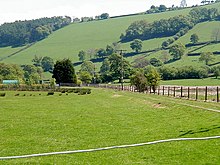Van Railway: Difference between revisions
added Category:1871 establishments in Wales using HotCat |
DuncanHill (talk | contribs) →Traffic: wl |
||
| (9 intermediate revisions by 5 users not shown) | |||
| Line 6: | Line 6: | ||
==Route== |
==Route== |
||
The line ran westwards from Caersws along the [[Cerist]] and [[Trannon]] river valleys, with [[railway halt|halt]]s near [[Penisafmanledd]] and [[Van, Llanidloes|Y Fan]]. An underground railway portal has been restored at the mine site |
The line ran westwards from Caersws along the [[Cerist]] and [[Trannon]] river valleys, with [[railway halt|halt]]s near [[Penisafmanledd]] and [[Van, Llanidloes|Y Fan]]. An underground railway portal has been restored at the mine site. |
||
==Traffic== |
==Traffic== |
||
Passengers were carried from 1873 until 1879. General freight was carried by the Cambrian Railways in 1896, to which company the line was leased.<ref>{{cite book | |
Passengers were carried from 1873 until 1879. General freight was carried by the [[Cambrian Railways]] in 1896, to which company the line was leased.<ref name=Gasquoine>{{cite book |first=C. P. |last=Gasquoine |title=The Story of the Cambrian|year=1973 |publisher=Christopher Davies Ltd}}</ref> The railway was a private venture by [[George Vane-Tempest, 5th Marquess of Londonderry|Earl Vane]], who also leased the mine to the mining company and was the chairman of the Cambrian Railway Company. It was built by David Davies of Llandinam, the contractor and colliery owner.<ref>{{Johnson-CRNH}}</ref> |
||
==John Ceiriog Hughes== |
==John Ceiriog Hughes== |
||
Until his death in 1887, [[John Ceiriog Hughes]] was Manager of the Van Railway, and it is said that many passengers "made pilgrimage along its short length ... for a chance of conversing with one of (Wales') most notable characters".<ref |
Until his death in 1887, [[John Ceiriog Hughes]] was Manager of the Van Railway, and it is said that many passengers "made pilgrimage along its short length ... for a chance of conversing with one of (Wales') most notable characters".<ref name=Gasquoine/> |
||
== References == |
== References == |
||
| Line 27: | Line 27: | ||
[[Category:Railway companies established in 1871]] |
[[Category:Railway companies established in 1871]] |
||
[[Category:1871 establishments in Wales]] |
[[Category:1871 establishments in Wales]] |
||
[[Category:1940 disestablishments in Wales]] |
|||
{{UK-rail-transport-stub}} |
{{UK-rail-transport-stub}} |
||
Latest revision as of 01:42, 4 August 2023


The Van Railway was a standard gauge railway in mid Wales. The line was built in 1871 to link the highly productive lead mines at Van, near Llanidloes to the main Cambrian line at Caersws. The mines closed in 1920, but the railway remained open until 1940.
Route[edit]
The line ran westwards from Caersws along the Cerist and Trannon river valleys, with halts near Penisafmanledd and Y Fan. An underground railway portal has been restored at the mine site.
Traffic[edit]
Passengers were carried from 1873 until 1879. General freight was carried by the Cambrian Railways in 1896, to which company the line was leased.[1] The railway was a private venture by Earl Vane, who also leased the mine to the mining company and was the chairman of the Cambrian Railway Company. It was built by David Davies of Llandinam, the contractor and colliery owner.[2]
John Ceiriog Hughes[edit]
Until his death in 1887, John Ceiriog Hughes was Manager of the Van Railway, and it is said that many passengers "made pilgrimage along its short length ... for a chance of conversing with one of (Wales') most notable characters".[1]
References[edit]
- ^ a b Gasquoine, C. P. (1973). The Story of the Cambrian. Christopher Davies Ltd.
- ^ Johnson, Peter (2013). The Cambrian Railways - a new history. Oxford Publishing Co. ISBN 978 0 86093 644 2.
- Baughan, Peter E. (1980). A Regional History of the Railways of Great Britain: Volume 11 North and Mid Wales (1st ed.). Newton Abbot: David & Charles. ISBN 0-7153-7850-3. OCLC 6823219.
- Baughan, Peter E. (1991). A Regional History of the Railways of Great Britain: Volume 11 North and Mid Wales (2nd ed.). Nairn: David St John Thomas. ISBN 0-9465-3759-3. OCLC 26361284.
